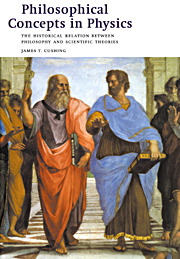 Philosophical Concepts in Physics
Philosophical Concepts in Physics Published online by Cambridge University Press: 05 June 2012
In this chapter we study one of the dramatic clashes that took place during the overthrow of the Aristotelian world view that had given man a unified picture of himself and of his surroundings. In the Galileo episode this became hopelessly entangled with the issue of intellectual freedom versus institutional authority. However, there were other relevant factors as well: the personalities of Galileo and of those who opposed him and, possibly, the social structure of the patronage system of support for artists and scientists in those times.
THE BACKGROUND
Perhaps it will help the reader if we begin by listing several key events that preceded the direct confrontation between Galileo and the Church authorities.
March 1610 – Galileo published the Sidereus Nuncius (The Starry Messenger) in which he discussed his telescopic observations and discoveries. He showed that there were many more stars in the heavens than had been thought previously, that the surface of the moon was rough, containing mountains, plains and valleys, much like the surface of the earth itself, and that Jupiter had a set of moons orbiting the central planet, very much as the planets orbit the sun in the Copernican system. This work had great popular appeal and wide impact.
December 1613 – Galileo wrote a letter to one of his scientific pupils, the Benedictine monk Benedetto Castelli (1578–1643), concerning his own views on the relation between science and religion.
[…]
To save this book to your Kindle, first ensure no-reply@cambridge.org is added to your Approved Personal Document E-mail List under your Personal Document Settings on the Manage Your Content and Devices page of your Amazon account. Then enter the ‘name’ part of your Kindle email address below. Find out more about saving to your Kindle.
Note you can select to save to either the @free.kindle.com or @kindle.com variations. ‘@free.kindle.com’ emails are free but can only be saved to your device when it is connected to wi-fi. ‘@kindle.com’ emails can be delivered even when you are not connected to wi-fi, but note that service fees apply.
Find out more about the Kindle Personal Document Service.
To save content items to your account, please confirm that you agree to abide by our usage policies. If this is the first time you use this feature, you will be asked to authorise Cambridge Core to connect with your account. Find out more about saving content to Dropbox.
To save content items to your account, please confirm that you agree to abide by our usage policies. If this is the first time you use this feature, you will be asked to authorise Cambridge Core to connect with your account. Find out more about saving content to Google Drive.